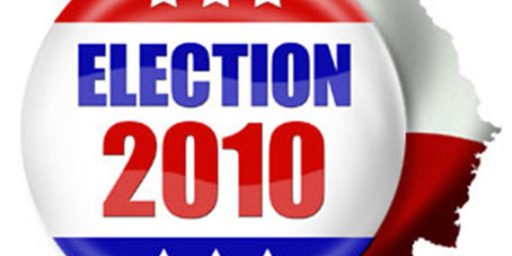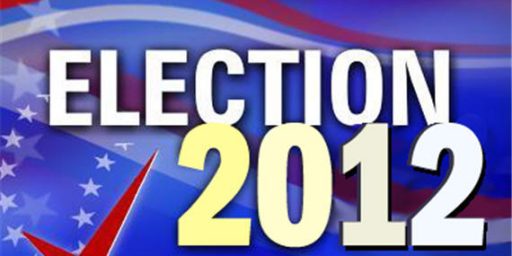1994 Generic Ballot Trending for Democrats
Hotline editor Chuck Todd presents a flashback to the generic congressional ballot surveys in the closing days of 1994:
ABC: — 47-46 in favor of the Dems (a 6-point swing in the last week toward the Dems)
Gallup: — 51-44 for the GOP (a 4 point swing in the last week toward the Dems)
NBC: — 46-35 for the GOP (a 2 point swing in the two weeks toward the Dems)
Times Mirror: — 48-43 for the GOP (a 7 point swing in the last month toward the Dems)
He says this is “worth noting as folks chatter all day about the meaning of today’s Pew, Gallup and ABC generic ballot closings.”
For those who have forgotten, that’s the year the Republicans took over both Houses in dramatic fashion.





But where this becomes less relevant is that it happened seven years before Sept. 11, 2001. It’s a different world today.
I really have trouble understanding how this poll metric is supposed to be used. First, you are going to get a very small subset for any individual district. Which means your margin of error goes up. Second, there is no distinction (that I know of) between close and in the bag elections.
As an example of the problem, assume I told you the generic ballot was 58% for the dems and 42% for the GOP based on voters in 10 districts. Sounds like a democratic tidal wave is a comin’. But if the races were 7 51-49 favoring the GOP and three 80-20 favoring the dems, the net result would be 70% of the seat going to the GOP despite a 16 point advantage. Obviously this is a made up example, but the point that looking at this, not the individual races is probably not worth much.
I think the point is that all these polls are absolutely meaningless, though the “ambiguous/undefined sample” point is also well made.
My own speculation is that the race isn’t as close as the oldest four polls indicate but the Democratic advantage isn’t as large as the three most recent polls would suggest. I’ve always suspected some narrowing of the Democratic lead as unsatisfied Republicans come to the conclusion that they will hold their nose and support the GOP candidate…primarily based upon fears that Democratic control of the Senate might jeopardize future Supreme Court appointments…which better explains the close Senate races in contrast to the growing evidence of Democratic strength in House races.
I can’t recall a time when concerns about the make up of the Supreme Court were more prevalent and I cannot find a better explanation for the disparate polling information that seems to show Democrats doing very well in contested House races while the Senate races seem to be tightening…and some of these Senate races actually appear to be trending Republican. Supporting the possibility that the Supreme Court consideration can explain voter differences between the House and Senate races would be the argument that there is clear voter opposition to the war in Iraq and a desire to impose some accountability on the Bush administration…and that would be in the form of a Democratic House.
Historically, in elections where the House switches control from one party to the other, the Senate also follows suit. Current polling in the individual Senate races seems to indicate that this election could defy that historical trend. I would argue that this may well happen based upon voter concerns about Supreme Court appointments which may lead enough swing voters to vote against their GOP House candidate while still supporting their GOP Senate candidate.
After all, it is the Senate that must approve Supreme Court appointments and voters may still favor conservative appointments…especially if one considers the opposition to same-sex marriage and a general belief that the Democratic Party is against any limitations on abortion rights. In other words, if voters want their unhappiness with the war in Iraq to be heard while still endorsing the social issues they seem to favor, the best solution would be to elect a Democratic House and maintain a Republican Senate.
Read more poll analysis here:
http://www.thoughttheater.com
The polls listed were actually not so bad.
The popular vote for the House in ’94 was
R – 51.5
D – 44.7
which is a 7 point gap. The Gallup poll seemed to nail it exactly. NBC was a little high for the GOP (11 pts), Time a little low (5 pts.). And ABC would have been just a touch low (5 pts) were it not for that last poll. In fact, the average of the 4 polls would have been exactly right, once again by ignoring that last ABC poll.